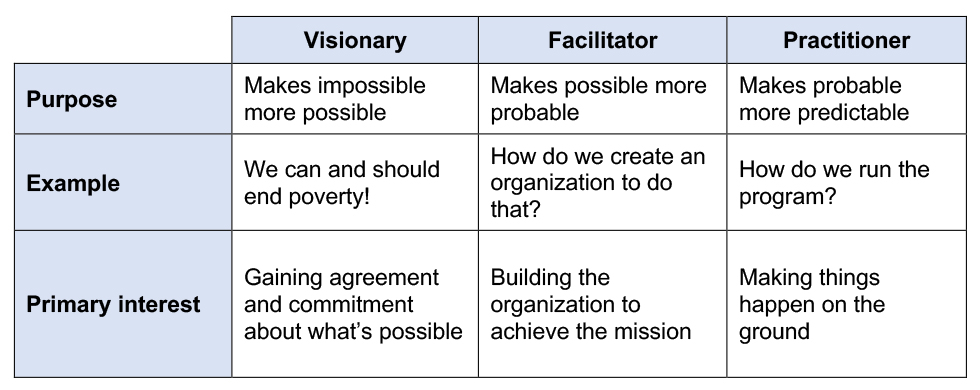Are You a Visionary, Facilitator, or Practitioner?
All three roles of visionary, facilitator, and practitioner contribute to achieving the vision of ending poverty, and we each possess all three capabilities. The question is: Which one is most dominant for you, and how does that fact affect your leadership? How you communicate your vision will in part be informed by whether you identify as a visionary, facilitator, or practitioner.
Based on a military model adapted from a talk by Vipin Gupta, a colleague and a research physicist at Sandia National Laboratories, here is a description of the three types:
The visionary says we need to take the hill. It’s an impossible task to most, but the visionary makes the impossible seem possible.
The facilitator prepares the hill to be taken. By negotiating with the visionary and translating the vision into action, she or he turns what’s possible into something probable.
The practitioner implements the day-to-day details for taking the hill. By collaborating with the Facilitator, he or she makes what’s probable more predictable.

Visionaries can see, often with great clarity, how the world could function after the transformation. Even in the face of many unknowns, visionaries have confidence that something new is possible. Facilitators appreciate the visionary’s vision and can see it well enough to help make it a reality. Facilitators possess patience and enthusiasm to figure out the practical steps, so they can implement the plan. It is often a disaster to put visionaries and practitioners in the same room without facilitators, because a practitioner’s questions might stop the flow of a visionary’s process.
We all have habits that identify our preferences. A practitioner might say, “Just tell me what needs to be done.” A facilitator might say, “I don’t want to be in charge, but I can help organize things in the background.” A visionary might say, “Let’s do this completely differently.”
Knowing what role feels best to you is important information. If you are not called to be a visionary, take heart, you can still lead a tremendous change. As a facilitator, you can seek out visionaries who need someone like you to translate their visions to others. If you are a practitioner, you can insist that visionaries and facilitators join the leadership team to play their roles.
Understanding the preferences of your teammates is equally important. If you plug people into the wrong roles, you will end up with unnecessary difficulties. Take the time to learn how to read people’s interests and skills with regard to the roles of visionary, facilitator, and practitioner.
Learn more: Transformational Leadership: A Framework to End Poverty ~ By Scott C. Miller
To learn more about Scott Miller, please see his website here.

